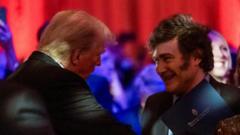In a bold political statement, Argentine President Javier Milei has confirmed his government’s intention to withdraw from the World Health Organization (WHO), citing significant disagreements over health management during the COVID-19 pandemic. A spokesperson for President Milei indicated that this decision was influenced by the recent exit announcement made by US President Donald Trump, who recently signed an executive order to initiate the withdrawal process from the WHO.
Milei's announcement is not only a reflection of his admiration for Trump—describing his US counterpart as "my favourite president"—but also an echo of the former president's arguments against the global health body. Both leaders seem to align in their critiques, particularly concerning the WHO's response to the pandemic and its perceived linkage to Chinese influence.
Milei's government argues that exiting the WHO will grant Argentina greater control over its health policies and funding. The spokesperson asserted that "we Argentines will not permit an international organization to interfere with our sovereignty." This aligns with Milei's self-identification as an "anarcho-capitalist," highlighting his preference for reduced international oversight.
The potential consequences of this decision, however, may not weigh heavily on the WHO's budget, as Argentina’s annual contribution is a mere fraction of the United States', which contributes around $950 million annually. Nonetheless, this raises concerns about a possible trend among other nations sharing similar viewpoints. If additional countries begin to withdraw from the WHO, the organization's credibility as the central global health authority may come into question.
Local media reports suggest Milei will shortly endorse an executive order to commence the withdrawal, igniting speculation about further actions related to international agreements, such as the Paris climate accord. Environmental advocates have expressed fears that Milei's policies could mirror those of the Trump administration, jeopardizing vital climate commitments in pursuit of national interests.
As debates continue regarding Milo's economic strategies and environmental policies, the allegiances and influence of the current Argentinian president will play a significant role on both a national and international stage.





















